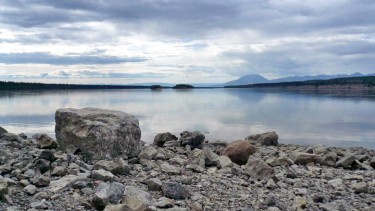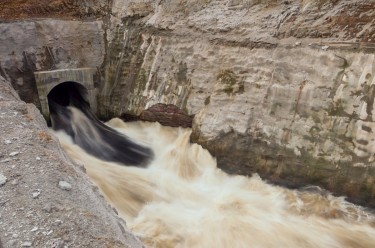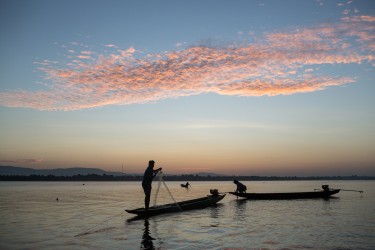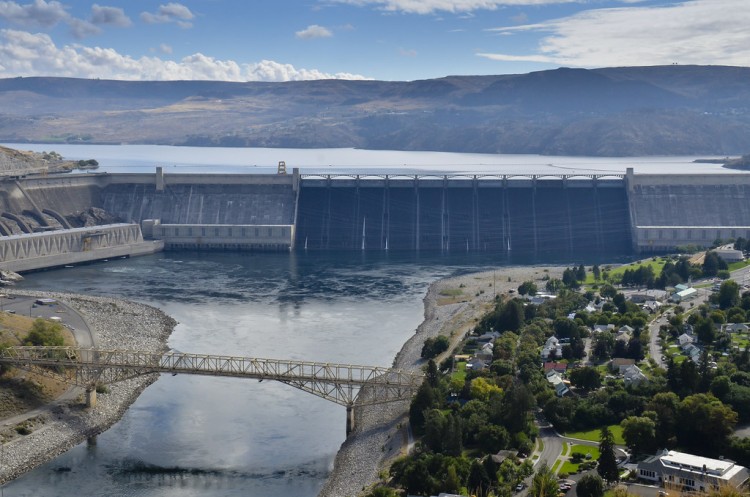Michelle Ma, UW News
May 8, 2019
Just over one-third of the world’s 246 longest rivers remain free-flowing, according to a new study published May 8 in Nature. Dams and reservoirs are drastically reducing the diverse benefits that healthy rivers provide to people and nature across the globe.

A team of 34 international researchers from McGill University, World Wildlife Fund, the University of Washington and other institutions assessed the connectivity status of 12 million kilometers of rivers worldwide, providing the first-ever global assessment of the location and extent of the planet’s remaining free-flowing rivers.
Among other findings, the researchers determined that only 21 of the world’s 91 rivers longer than 1,000 kilometers (621 miles) that originally flowed to the ocean still retain a direct connection from source to sea. The planet’s remaining free-flowing rivers are largely restricted to remote regions of the Arctic, the Amazon Basin and the Congo Basin.
“The world’s rivers form an intricate network with vital links to land, groundwater, and the atmosphere,’’ said lead author Günther Grill of McGill’s Department of Geography. “Free-flowing rivers are important for humans and the environment alike, yet economic development around the world is making them increasingly rare. Using satellite imagery and other data, our study examines the extent of these rivers in more detail than ever before.”
Dams and reservoirs are the leading contributors to connectivity loss in global rivers. The study estimates there are around 60,000 large dams worldwide, and more than 3,700 hydropower dams are currently planned or under construction. They are often planned and built at the individual project level, making it difficult to assess their real impacts across an entire basin or region.

“Our findings are quite sobering — ongoing dam construction will continue to dwindle the number of remaining free-flowing rivers,” said co-author Julian Olden, a professor at the UW School of Aquatic and Fishery Sciences. “But, optimistically, the removal of aging and obsolete dams can help reverse this course.”
Healthy rivers support freshwater fish stocks that improve food security for hundreds of millions of people, deliver sediment that keeps deltas above rising seas, mitigate the impact of extreme floods and droughts, prevent loss of infrastructure and fields to erosion and support a wealth of biodiversity. Disrupting rivers’ connectivity often diminishes or even eliminates these critical ecosystem services.
“Science clearly points to the importance of habitat connectivity to support healthy populations of Pacific salmon,” Olden said. “The findings of our study put the challenges facing the Columbia River Basin and many Puget Sound rivers into a global context.”
Protecting remaining free-flowing rivers is also crucial to saving biodiversity in freshwater systems. Recent analysis of 16,704 populations of wildlife globally showed that populations of freshwater species experienced the most pronounced decline of all vertebrates over the past half century, falling on average 83 percent since 1970.

The study also notes that climate change will further threaten the health of rivers worldwide. Rising temperatures are already impacting flow patterns, water quality and biodiversity. Meanwhile, as countries around the world shift to low-carbon economies, hydropower planning and development is accelerating, adding urgency to the need to develop energy systems that minimize overall environmental and social impact.
“While hydropower inevitably has a role to play in the renewable energy landscape, countries should also consider other renewable options,” said Michele Thieme, lead freshwater scientist at World Wildlife Fund. “Well-planned wind and solar energy can have less detrimental impacts on rivers and the communities, cities, and biodiversity that rely on them.”
The international community is committed to protect and restore rivers under Agenda 2030 for Sustainable Development, which requires countries to track the extent and condition of water-related ecosystems. This study delivers methods and data necessary for countries )to maintain and restore free-flowing rivers around the world.
See the paper for a full list of co-authors and institutions.
This study was funded by World Wildlife Fund, the Natural Sciences and Engineering Research Council of Canada and McGill University.
For more information, contact Olden at olden@uw.edu. To reach authors at McGill University or World Wildlife Fund, contact Brooke Hirsheimer at brooke.hirsheimer@wwfus.org or (202) 495-4759.
This has been adapted from a World Wildlife Fund news release.
